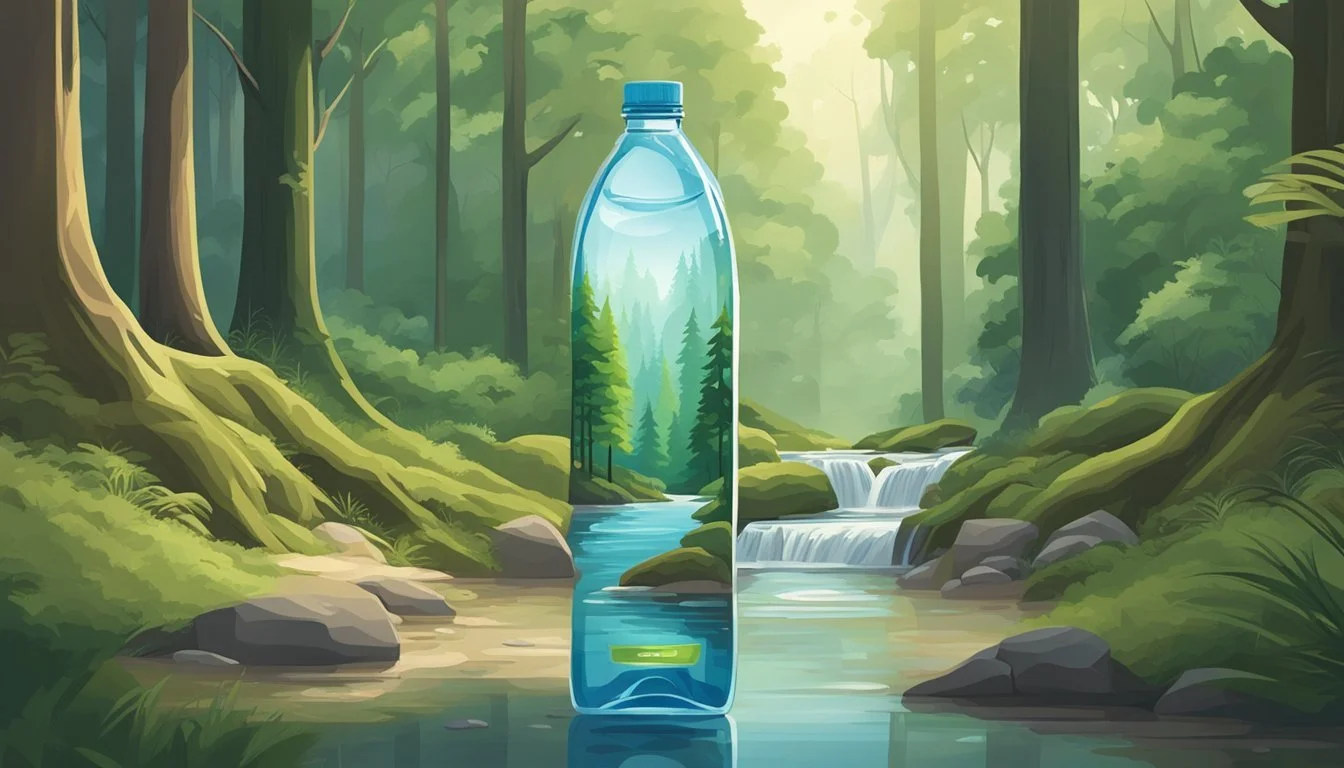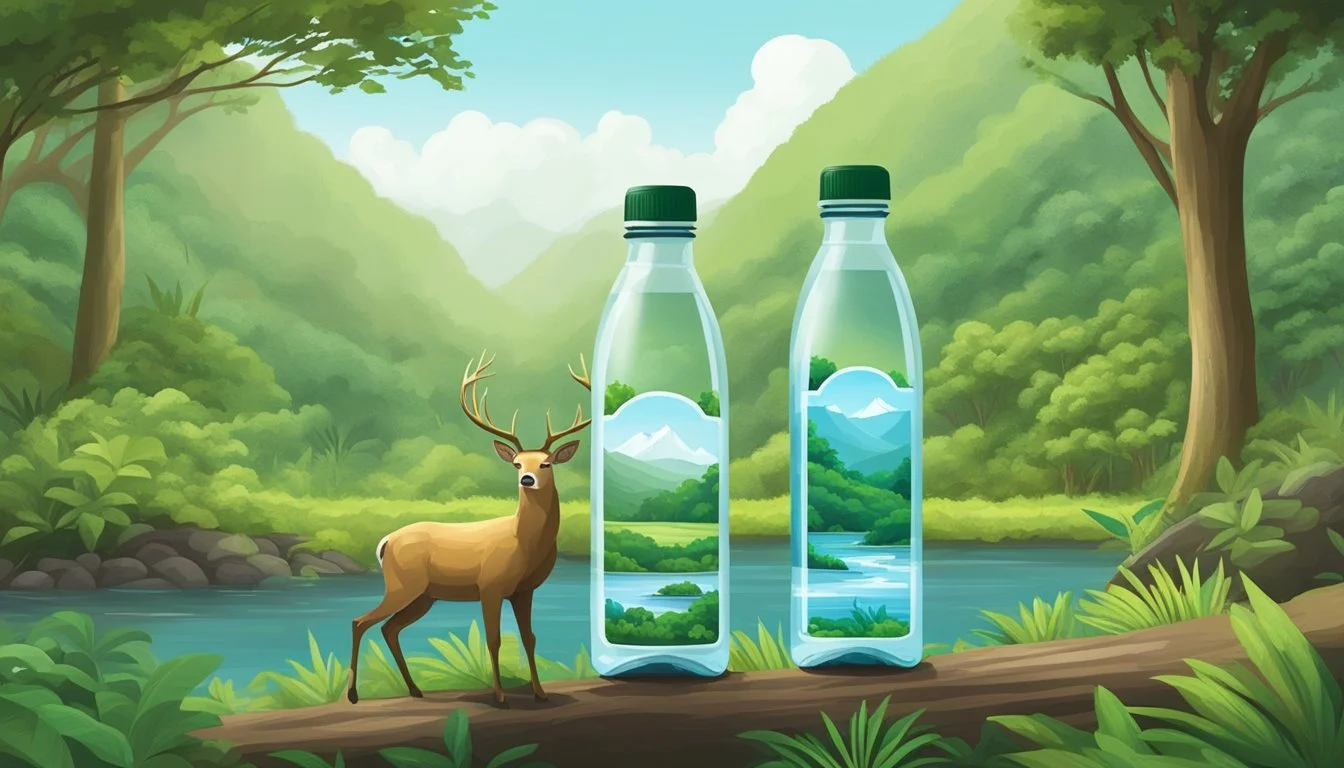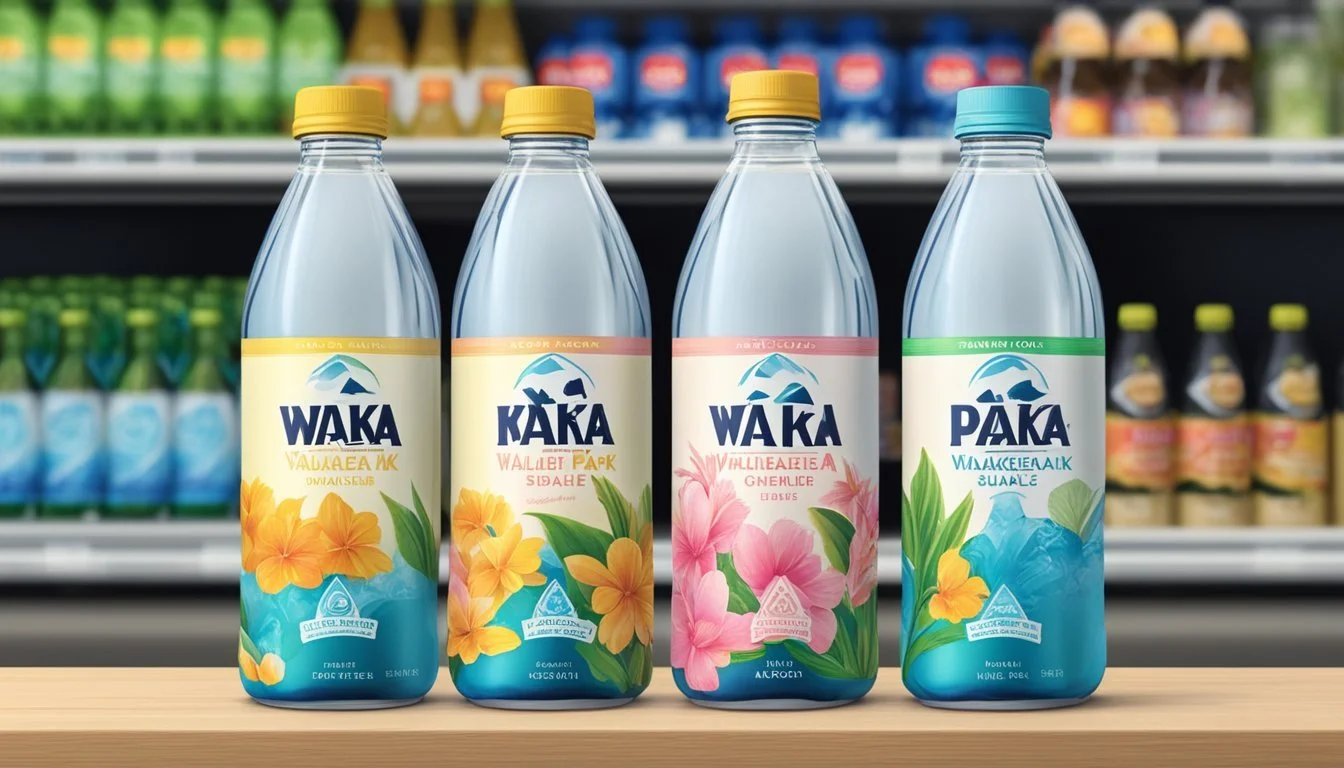Deer Park vs. Waiakea
Head-to-Head Bottled Water Comparison
Choosing between Deer Park and Waiakea can be challenging for bottled water enthusiasts. Deer Park, a product of the Nestlé brand, prides itself on being 100% natural spring water, sourced from the great Eastern Seaboard. Known for its crisp and clean taste, this bottled water offers simplicity and reliability that many consumers appreciate.
Waiakea, on the other hand, brings something unique to the table. Sourced from the Mauna Loa volcano in Hawaii, Waiakea water is naturally alkaline with a pH of 8.8, making it distinct in flavor and beneficial for health. It also boasts sustainability credentials with eco-friendly packaging and efforts to reduce carbon emissions.
When comparing Deer Park and Waiakea, Waiakea edges out Deer Park with its superior health benefits and sustainability practices. While both offer refreshing taste experiences, Waiakea's commitment to the environment and unique health properties make it a preferred choice for discerning consumers.
Understanding Bottled Water
Bottled water has various forms, each boasting distinct sources and characteristics. Understanding these differences can help you make informed choices about what you drink and its potential benefits.
Types of Bottled Water
Spring Water: This is sourced from natural springs and tends to have a fresh and crisp taste due to its natural filtration through rocks. Deer Park is a prime example, sourced from various springs along the Eastern Seaboard.
Purified Water: This type undergoes rigorous purification processes to remove impurities. Brands like Aquafina and Dasani fall into this category, known for their clean and consistent taste.
Mineral Water: Containing naturally occurring minerals, this water can provide additional health benefits. For example, Fiji Water contains silica and magnesium.
Alkaline Water: With a higher pH level, alkaline water is believed to help neutralize acidity in the body. Waiakea water, sourced from volcanic wells in Hawaii, falls into this category.
Artesian Water: This water is drawn from confined aquifers, which are layers of rock that contain water under pressure. It often has a unique mineral profile.
Carbonated Water: Also known as sparkling water, this type is infused with carbon dioxide gas. Brands such as la Croix are popular in this category.
Bottled Water Industry Overview
The bottled water industry is vast, dominated by major players like Nestlé, Coca-Cola, and PepsiCo. These corporations own several prominent brands such as Poland Spring, Smartwater, and Aquafina.
This market has seen significant growth due to concerns over tap water safety and a trend towards healthier beverage choices. Bottled water is often marketed with promises of purity and health benefits, which appeal to a wide range of consumers.
Environmental concerns also play a role in the industry, prompting some brands to adopt more sustainable practices. Waiakea, for instance, is certified Carbon Neutral and donates a portion of its revenue to environmental causes.
Health and Hydration
Bottled water can provide important minerals and electrolytes, contributing to overall health and hydration. Minerals such as calcium, magnesium, and potassium are often found in mineral water, which can support bone health, muscle function, and electrolyte balance.
Fluoride is another component found in certain bottled waters, beneficial for dental health. However, the presence of contaminants like PFAS chemicals in some bottled waters has raised health concerns, making it important to choose brands carefully.
Hydration is essential for maintaining bodily functions, and bottled water offers a convenient way to ensure adequate intake. Brands like Deer Park and Waiakea provide not only hydration but also additional health benefits due to their unique mineral profiles.
Exploring the Water Source
The water sources of Deer Park and Waiakea are remarkably different, with each offering unique characteristics that affect the taste and quality of their bottled water.
Natural Springs and Artesian Aquifers
Deer Park sources its water from springs scattered across the eastern regions of the United States. These natural springs provide 100% natural spring water, renowned for its crisp taste and refreshing qualities. The origins of Deer Park's water can be traced back to specific locations like Deer Park, Maryland, adding a sense of historical authenticity to the brand.
Waiakea distinguishes itself by tapping into an artesian aquifer fed by the Mauna Loa Volcano in Hawaii. The water filters through porous volcanic rock, enriching it with naturally occurring electrolytes and minerals. This volcanic groundwater is often described as smooth and slightly alkaline, contributing to Waiakea's distinct taste and health benefits.
Municipal Sources and Purification
Deer Park does not rely on municipal sources; its commitment to natural spring water ensures minimal human intervention beyond bottling and basic filtration to maintain purity. This dedication to spring sources is a significant selling point for consumers seeking unaltered natural water.
Waiakea also avoids tap water as a source, ensuring its water is free from the typical purification processes associated with municipal supplies. Instead, Waiakea focuses on a natural filtration process through volcanic rock, eliminating the need for extensive additional purification methods such as reverse osmosis. This natural process preserves the unique qualities of Waiakea's volcanic water, appealing to those who prioritize natural filtration over human-made purification systems.
Taste and Purity Factors
When comparing Deer Park and Waiakea bottled waters, factors such as pH levels, alkalinity, and mineral content significantly affect their taste and purity.
pH Levels and Alkalinity
Waiakea boasts a naturally high pH of 8.2, positioning it in the alkaline range. This higher pH is marketed as beneficial for maintaining the body's pH balance and promoting overall health. Additionally, Waiakea's alkalinity can contribute to a smooth, clean taste.
On the other hand, Deer Park typically has a pH level closer to neutral, around 7. This neutral pH supports its crisp and clean taste, appealing to those who prefer a straightforward and less mineralized flavor. The difference in alkalinity between these two brands often leads to a noticeable contrast in taste and perceived purity.
Mineral Content and Flavor Profile
Waiakea’s water is sourced from volcanic rock, infusing it with minerals such as silica, calcium, and magnesium. These minerals not only offer potential health benefits but also contribute to a distinctly smooth flavor profile. Silica, in particular, adds to the water’s silky texture which many consumers find appealing.
Deer Park, sourced from springs across the Eastern Seaboard, contains natural minerals that lend it a crisp and clean taste. The mineral content in Deer Park is generally lower than Waiakea, which can make the flavor more subtle. The specific mineral composition—like trace amounts of calcium and magnesium—enhances the water's refreshing quality, maintaining its widespread appeal.
Environmental and Ethical Considerations
When comparing Deer Park and Waiakea bottled water brands, it's crucial to look at their environmental impact and community initiatives. Both companies make claims regarding their sustainability practices, but their approaches differ significantly.
Sustainable Practices and Packaging
Waiakea emphasizes its commitment to sustainability by using 100% recycled materials for its bottles. It stands out as a Carbon Neutral certified brand, which means its entire process, from sourcing to packaging, aims to minimize carbon emissions. They offset their carbon footprint through various environmental projects, reflecting a strong corporate responsibility towards the environment.
Deer Park, while known for sourcing water from natural springs, implements efforts to reduce plastic use by incorporating recycled materials in its packaging. However, it does not highlight a comprehensive carbon neutrality goal. Their focus mainly lies in streamlining production processes to lessen their environmental impact, rather than on offsetting existing carbon emissions.
Water Brand Initiatives and Community Engagement
Waiakea not only prioritizes sustainability but also commits to community engagement. They donate over 5% of their revenue to nonprofits in Hawaii and globally. This shows a strong dedication to not just environmental issues but also corporate responsibility in aiding community development. Their initiatives aim to provide clean water and improve living conditions in underserved regions.
Deer Park has fewer highlighted initiatives compared to Waiakea regarding community engagement. They do contribute to local watershed protection efforts and partner with environmental organizations to promote sustainability. These partnerships are part of their larger effort to maintain water quality and the health of the ecosystems surrounding their spring sources.
In summary, while Deer Park shows commitment to sustainable packaging and local environmental efforts, Waiakea sets a more comprehensive standard by integrating broader community support and strong sustainability certifications into their brand identity.
Safety and Regulatory Oversight
When selecting bottled water, it's essential to consider safety standards and regulatory measures. This section delves into the FDA regulations that both Deer Park and Waiakea must adhere to, and the contaminants and purification methods each brand employs.
FDA Regulations and Compliance
The U.S. FDA regulates bottled water to ensure it meets stringent standards for safety and quality. Deer Park, a Nestlé brand, follows these federal regulations to maintain its claim of 100% natural spring water. These standards cover everything from permissible contaminant levels to labeling accuracy.
Waiakea Hawaiian Volcanic Water also complies with FDA regulations, ensuring it meets safety and quality benchmarks. By adhering to these requirements, Waiakea ensures that its naturally alkaline water is safe for consumers. Both brands must regularly test their water to adhere to the maximum allowable limits for contaminants such as lead, arsenic, and mercury, ensuring consumer safety.
Contaminants and Purification Methods
Water contaminants such as PFAS chemicals, lead, arsenic, and mercury pose significant health risks. Deer Park has been noted for following rigorous testing protocols to ensure its water remains free from harmful contaminants. Despite this, Consumer Reports found that some bottled water brands, including carbonated types, contained varying levels of PFAS chemicals.
Waiakea water also emphasizes rigorous testing and purification processes. The brand employs natural filtration through volcanic rock, providing a unique purification method that helps reduce contaminants. Additionally, ozone sterilization is used to ensure the water is free from harmful bacteria and pathogens. This combination of natural and technological purification methods delivers water that is both safe and by regulatory standards.
Comparing Deer Park and Waiakea
Deer Park and Waiakea are two prominent bottled water brands known for their distinct sources, purity, and taste profiles. This section examines their origins, mineral compositions, flavor, environmental initiatives, and affordability.
Source and Origin Comparison
Deer Park sources its water from multiple natural springs along the eastern seaboard of the United States. This vast region adds to the brand's reputation for delivering crisp, refreshing spring water.
Waiakea, however, originates from the Mauna Loa volcano in Hawaii. The water naturally filters through volcanic rock, infusing it with minerals. Its volcanic origin provides a unique backstory that appeals to many consumers.
Purity and Mineral Composition
Deer Park prides itself on offering 100% natural spring water. It undergoes rigorous testing to maintain purity standards but contains relatively low mineral content.
Waiakea's water is rich in naturally occurring electrolytes and minerals due to its volcanic filtration process. With higher total dissolved solids (TDS), Waiakea provides a robust mineral profile. This includes magnesium, calcium, and silica, contributing to its smooth taste and health benefits.
Taste Profile and Consumer Preferences
Consumers often describe Deer Park water as crisp and clean with a neutral flavor profile, making it a go-to choice for refreshment.
Waiakea's water, enriched with volcanic minerals, has a slightly alkaline pH and a smooth, slightly sweet taste. Some consumers find its unique taste more refreshing, enhancing its appeal.
Environmental Practices and Sustainability
Deer Park is committed to sustainability through various initiatives, including using recycled PET (rPET) bottles and improving its water sourcing practices.
Waiakea stands out with its carbon-neutral certification. The company employs sustainable harvesting from an aquifer and contributes to global clean water initiatives. These efforts significantly reduce their environmental impact.
Cost and Convenience Factors
Deer Park, widely available across the eastern United States, is considered affordable and convenient for many consumers. Its broad distribution network ensures easy access in most grocery stores.
Waiakea, while a bit more premium in price, targets consumers willing to pay extra for unique water characteristics and sustainability efforts. It is primarily available online and in select retail locations, slightly limiting convenience.
The table below summarizes the key differences:
Feature Deer Park Waiakea Source Eastern Seaboard Springs Mauna Loa Volcano, Hawaii Mineral Content Low High (Electrolytes, Minerals) Taste Crisp, Clean Smooth, Slightly Sweet Sustainability Recycled PET, Eco-friendly Carbon Neutral, Sustainable Harvest Cost Affordable Premium Convenience Widely Available Limited Retail, Online
These comparisons offer a clear perspective on what each brand brings to the table, helping consumers make informed choices.
More About Deer Park
Deer Park vs Cascade Mountain: Which Bottled Water is Better?
Deer Park vs Hawaii Volcanic: Which Bottled Water is Better?
Deer Park vs Hawaiian Springs: Which Bottled Water is Better?
Deer Park vs Icelandic Glacial: Which Bottled Water is Better?
Deer Park vs Kirkland Signature: Which Bottled Water is Better?
Deer Park vs Mountain Valley Spring Water: Which Bottled Water is Better?
Deer Park vs Nestle Pure Life: Which Bottled Water is Better?
Deer Park vs Richard's Rainwater: Which Bottled Water is Better?
Deer Park vs Solan de Cabras: Which Bottled Water is Better?
Deer Park vs Talking Rain AQA: Which Bottled Water is Better?
Deer Park vs Whole Foods 365: Which Bottled Water is Better?
Deer Park vs Whole Foods Italian Still Mineral water: Which Bottled Water is Better?
More About Waiakea
Icelandic Glacial vs Waiakea: Which Bottled Water is Better?
Mountain Valley Spring Water vs Waiakea: Which Bottled Water is Better?
Waiakea vs Kirkland Signature: Which Bottled Water is Better?
Waiakea vs Richard's Rainwater: Which Bottled Water is Better?
Waiakea vs Whole Foods Italian Still Mineral water: Which Bottled Water is Better?





